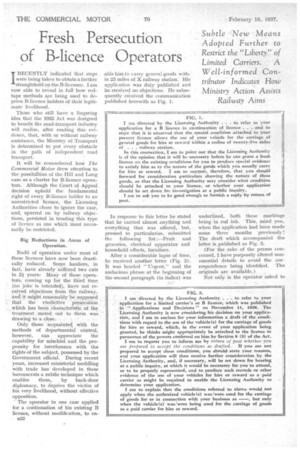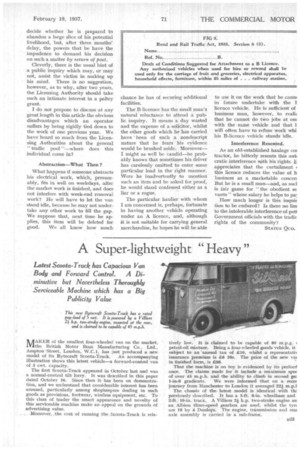Fresh Persecution of B-licence Operators
Page 40

Page 41

If you've noticed an error in this article please click here to report it so we can fix it.
/RECENTLY indicated that steps were being taken to obtain a further . stranglehold on the B-licensee. I am now able to reveal in full how redtape methods are being used to deprive B-licence holders of their legitimate livelihood.
Those who still have a lingering idea that the 1933 Act was designed to benefit the road-transport industry will realize, after reading this evidence, that, with or without railway assistance, the Ministry of Transport is determined to put every obstacle in the path of independent road transport.
It will be remembered how The Commercial Motor drew attention to the possibilities of the IliII and Long case as a charter for B-licence operators: Althmigh the Court of Appeal. decision upheld the fundamental right of every B-licence holder to an unrestricted licence, the Licensing Authorities chose to ignore the case,
• and, Spurred on by railway objections, persisted in treating this type of licence as one which must necessarily be restricted.
Big Reductions in Areas of Operation.
Radii of operation under most of these licences have now been drastically reduced. Some hauliers, in fat, have already :suffered two cuts in 2-4 years: Many of these operators, coming up for the third time (no joke: is intended), have not received objections, from the railway, and it might .rea.sonahly he.supposed that the vindictive .persecution which has been characteristic of the treatment meted, out to them was drawing to a close.
Only those acquainted with the methods of departmental control, however, can appreciate the capability for mischief and the propensity for interference with the rights of the subject, possessed by the Government official, During recent years, increased ministerial meddling with trade has developed in these bureaucrats a subtle technique which enables them, by back-door diplomacy, to deprive the victim of his very livelihood, without effective opposition.
The operator in one case applied for a continuation of his existing B licence, without modification, to en-.
• B22
In response to this letter he stated that he carried almost anything and everythingthat was offered, but, pressed to particularize, submitted the following list :—Fruit and groceries, electrical apparatus and household effects, furniture,
After a considerable lapse of time, he received another letter (Fig. 2). It was headed "Urgent," and the audacious phrase at the beginning of the second paragraph (in italics) was underlined, both these markings being in red ink. This, mind you, when the application had been made seine three months previously ! The draft which accompanied the letter is published as Fig. 3.
(For the sake of the person concerned, I have purposely altered nonessential details to avoid the correspondence being identified. The originals are available.) Not only is the operator as ed to
decide whether he is prepared to abandon a large slice of his potential livelihood, but, after three months' delay, the powers that be have the impudence to demand his decision on such a matter by r eturn of post.
Cleverly, there is the usual hint of a public inquiry which may, or may not, assist the victim in making up his mind. There is no suggestion, however, as to why, after two years, the Licensing Authority should take such an intimate interest in a paltry grant.
I do not propose to discuss at any great length in this article the obvious disadvantages which an operator suffers by being rigidly tied down to the work of one previous year. We have heard so much from the Licensing Authorities about the general "traffic pool "—where does this individual come in?
Abstraction—What Then ?
What happens if someone abstracts his electrical work, which, presumably, fits in well on weekdays, after the market work is finished, and does not interfere with week-end removal Work? He will have to let the van stand idle, because he may not undertake any other work to fill the gap. We suppose that, next time he applies, this item will be deleted for good. We all know how much chance he has of securing additional facilities.
The B-licensee has the small man's natural reluctance to attend a public inquiry. It means a day wasted and the expense of a solicitor, whilst the other goods which he has carried have 'been of such a nondescript nature that he fears his eyidence would be brushed aside. Moreover— I might as well be candid—he probably knows that sometimes his driver has carelessly omitted to enter some particular load in the right manner. Were he inadvertently to mention such an item and be asked for proof, he would stand confessed either as a liar or a rogue.
The particular haulier with whom I am concerned is, perhaps, fortunate in having another vehicle operating under an A licence, and, although it is not suitable for carrying general merchandise, he hopes he will be able
to use it on the work that he canin in future undertake with the I licence vehicle. He is sufficient of business man, however, to realii that he cannot do two jobs at om with the same vehicle and that I will often have to refuse work whi his B-licence vehicle stands idle.
Interference Resented.
As an old-established haulage coi tractor, he bitterly resents this auta cratic interference v■th his rights. t appreciates that the curtailment this licence reduces the value of h business as a marketable concen But he is a small man—and, as sucl is fair game for "the obedient se 'ants" whose salary he helps to pa:
How much longer is this inquis tion to be endured? Is there no Jim to the intolerable interference of peti Government officials with the tradir rights of the community?
STATUS Quo.




















































































